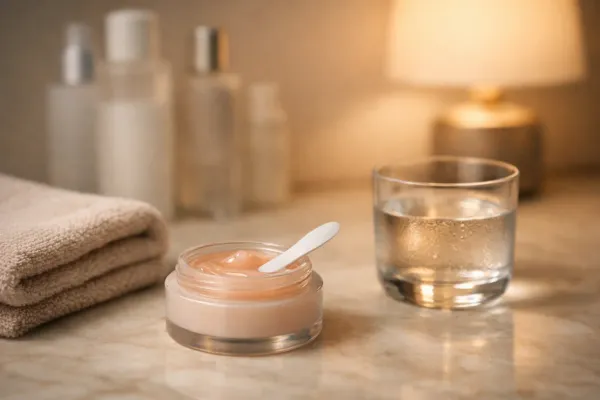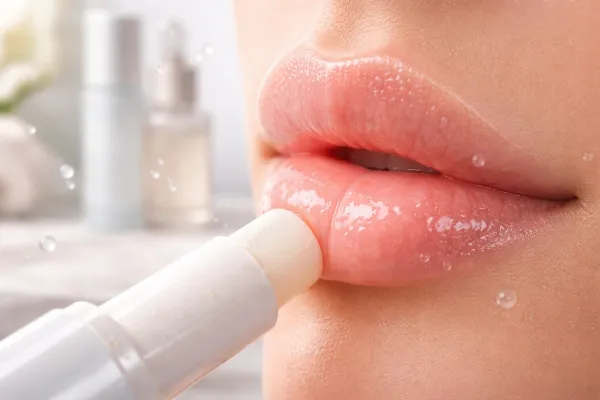8 Critical Ways Sugar Sabotages Your Skin's Health & How to Reverse It
Sugar sabotages your skin health! Learn 8 critical ways sugar causes aging, acne, and dullness. Discover practical tips to reverse its effects for clearer, healthier, and more radiant skin.
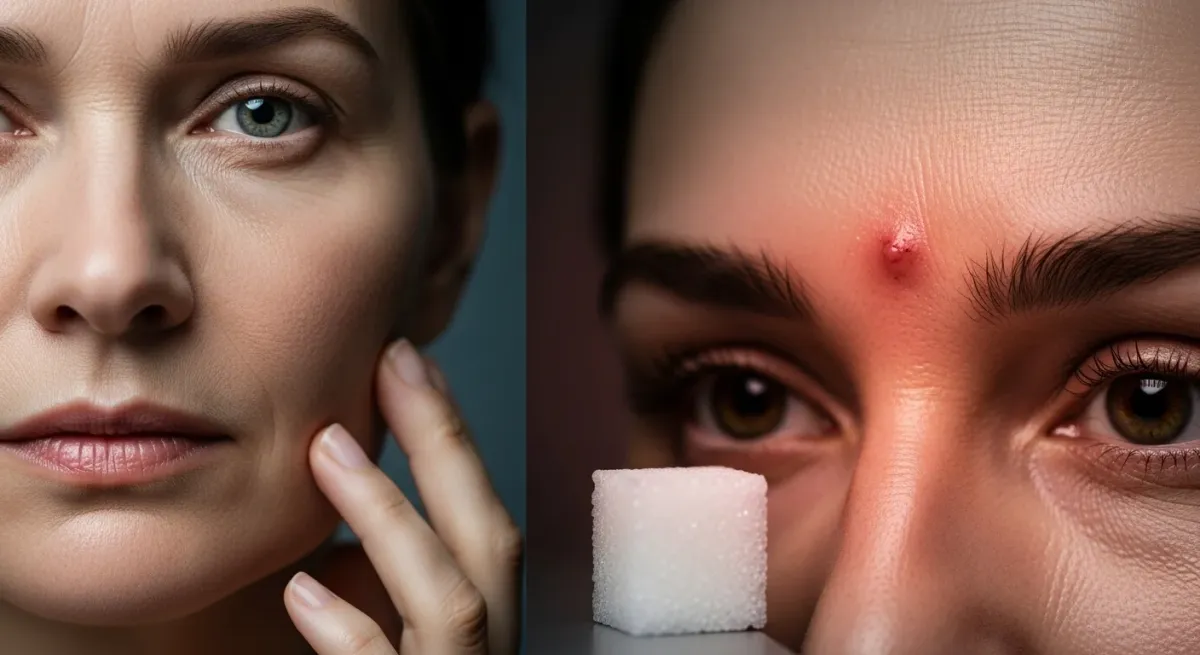
You eat sugar. Everyone does.
But do you know how it truly harms your skin? It’s not just about calories. Excess sugar actively works against your glow.
Sugar Sabotages Your Skin’s Health — Quick Summary
Quick Picks
Sugar Sabotages Your Skin’s Health
- Cap added sugar near ~25 g/day (women) or ~36 g/day (men) as a practical ceiling.
- Favor low‑glycemic carbs (steel‑cut oats, legumes, berries) over refined flours.
- Build plates with the FPF formula: Fiber + Protein + Fat to blunt glucose spikes.
- Swap sugary drinks for water, unsweetened tea, or sparkling water with lime.
- Choose whole fruit over juices; pair fruit with nuts/yogurt to steady energy.
- Use spices and bitters (cinnamon, cacao, lemon, arugula) to satisfy sweet cravings.
- Read labels: watch for aliases like maltose, syrup, dextrin, and “evaporated cane juice.”
- Time treats after meals, not on an empty stomach, to minimize glycemic swings.
- Sleep 7–9 hours; sleep loss increases cravings and disrupts insulin control.
- Prioritize daily movement (walks after meals) to improve glucose handling and calm breakouts.
Tip: If cutting back fast feels tough, reduce by ~5–10 g per week and track skin changes with photos.
This guide will show you exactly how sugar damages your skin and what you can do about it. Get ready to learn the real facts.
"How Sugar Affects Your Skin" in a Nutshell
Sugar is a hidden enemy for your skin. It causes problems you might not even realize.
Here’s what you need to know fast:
- Sugar speeds up aging. It breaks down important skin proteins.
- It triggers breakouts. Think more acne and oily skin.
- Your skin gets inflamed. This means redness and irritation.
- It makes your skin look dull. That healthy glow disappears.
- You can fix it. Simple diet and skincare changes make a big difference.
Understanding the Sugar-Skin Connection: The Science Behind the Sweet Threat
Your skin is a complex organ.
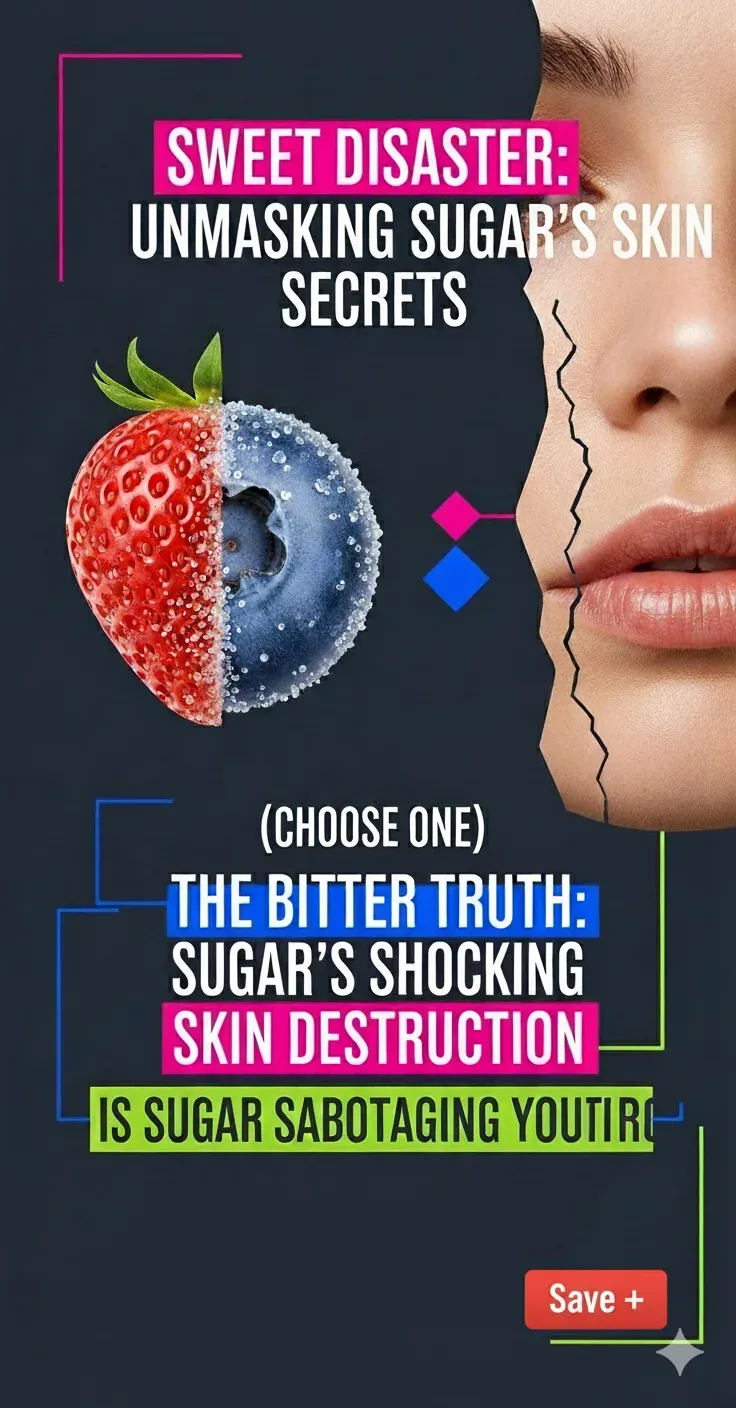
What you eat directly affects its health. Sugar, especially processed sugar, plays a huge role. It starts a chain reaction in your body that shows up on your face. Understanding this helps you fight back.
When you eat sugar, your blood sugar levels go up. This surge causes problems. It affects key parts of your skin’s structure. Over time, these effects really add up.
What is Glycation and Why Does it Matter?
Glycation is a major problem for your skin. It happens when sugar in your bloodstream attaches to proteins. This forms harmful molecules called AGEs. AGEs stand for Advanced Glycation End products.
These AGEs attack your collagen and elastin. Collagen gives your skin its firmness. Elastin helps it snap back. When AGEs damage them, your skin loses its bounce. This process makes your skin look older, faster National Institutes of Health. It’s like a slow, sticky breakdown.
The Role of Insulin and Inflammation
Eating a lot of sugar also spikes your insulin levels. Insulin is a hormone. Its job is to move sugar from your blood into your cells. High insulin levels can kick off inflammation in your body.
Inflammation is your body's response to harm. Chronic inflammation damages healthy cells. This shows up on your skin as redness, puffiness, and irritation. It also makes existing skin issues worse.
Oxidative Stress and Free Radical Damage
Sugar intake can also lead to more oxidative stress. This means your body creates more "free radicals." Free radicals are unstable molecules. They attack healthy skin cells.
Think of it like tiny bullies in your skin. They damage cell structures. This damage contributes to aging and a tired appearance. Antioxidants fight these free radicals. But too much sugar overpowers them.
The 8 Critical Ways Sugar Damages Your Skin (And What to Do About It)
Sugar isn't just sweet; it's skin sabotage. Here are the specific ways your daily dose of sugar might be harming your skin. Each point reveals a common issue.
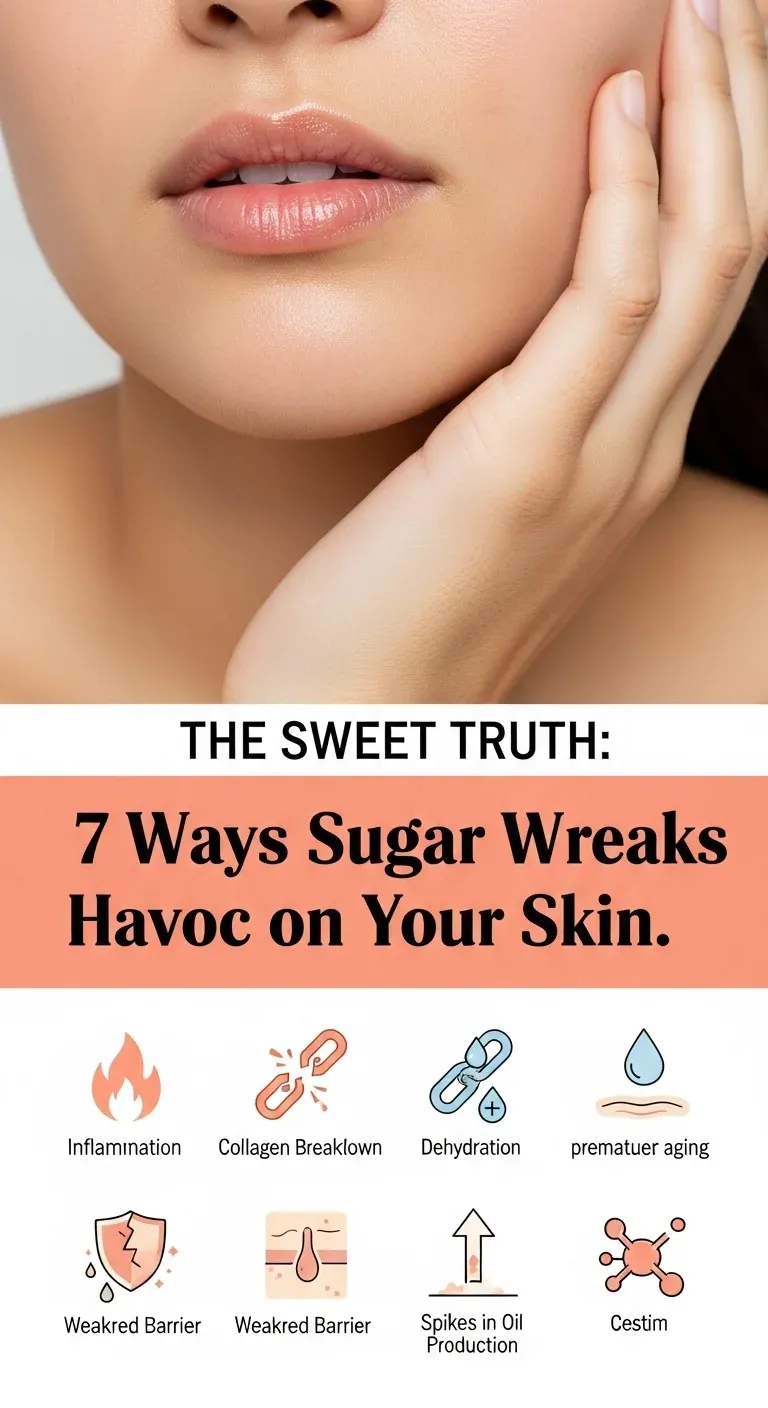
| Skin Issue | Sugar's Impact on Skin | How to Reduce Risk |
|---|---|---|
| Wrinkles | Breaks down collagen & elastin | Limit sweet foods, eat antioxidant-rich foods |
| Acne | Increases inflammation, boosts oil production | Lower blood sugar spikes, eat a clean diet, check hormones |
| Dullness | Slows skin cell turnover, harms hydration | Hydrate well, cut processed sugar, use gentle exfoliants |
| Redness | Triggers inflammation responses | Reduce inflammatory foods, identify triggers |
Accelerating Aging and Wrinkle Formation (AGEs & Collagen)
Sugar is a fast track to older-looking skin. The glycation process creates those AGEs we talked about. These AGEs directly attack collagen and elastin fibers. These fibers keep your skin smooth and firm.
When collagen and elastin are damaged, they become stiff. They lose their ability to stretch and repair. This leads to sagging skin and deeper wrinkles. Your skin loses its youthful bounce. Want to fight this? Boost your collagen levels here.
Triggering or Worsening Acne Breakouts
Got acne? Sugar could be the culprit. A high sugar diet causes quick spikes in blood sugar. This boosts insulin and other hormones. These hormones can make your skin produce more oil, called sebum.
More sebum means clogged pores. Clogged pores lead to pimples and breakouts. Sugar also fuels inflammation. This makes acne worse and more painful Charleston Dermatology.
Many people see clearer skin when they cut back on sweets. Stop those breakouts by learning how to prevent acne.
Causing Skin Inflammation and Redness
Sugar is a known inflammatory food. High sugar intake makes your body more reactive. This shows up as redness, irritation, and even puffiness on your skin. It’s your body crying for help.
This constant low-grade inflammation can harm your skin health. It prevents cells from repairing themselves properly. If your skin always looks a bit red or bothered, sugar might be the reason.
Impairing Skin's Natural Barrier Function
Your skin has a protective barrier. This skin barrier keeps moisture in and bad stuff out. Too much sugar can mess with this important shield. It can weaken the barrier.
A weak barrier means your skin gets dry easily. It also becomes more sensitive. It can't fight off irritants as well. This makes your skin more vulnerable to damage.
Leading to Dullness and Uneven Skin Tone
Want bright, glowing skin? Then cut the sugar. Glycation and inflammation slow down skin cell turnover. This means old, dead skin cells stick around longer. They make your complexion look tired and dull skin.
Sugar can also affect melanin production. This leads to an uneven skin tone. Dark spots might seem more stubborn. Your skin loses its natural radiance.
Increasing Oil Production (Sebum)
As mentioned, sugar can directly impact your oil glands. High blood sugar and insulin can signal these glands. They then pump out more sebum. This extra oil creates problems.
More oil often means shinier skin. It also means a higher chance of clogged pores. If you struggle with oily skin, look closely at your sweet foods intake.
Exacerbating Conditions Like Rosacea & Eczema
For those with skin conditions, sugar is bad news. Conditions like rosacea and eczema are often linked to inflammation. Since sugar causes inflammation, it can make these conditions flare up.
Increased redness, itching, and discomfort are common. Managing your sugar intake can be a key step. It can help calm these tricky skin issues.
Impacting Wound Healing and Scarring
Sugar also affects your body's repair systems. High blood sugar can slow down wound healing. This means cuts and scrapes take longer to get better. It also makes you more prone to infection.
When wounds heal slowly, there's a higher chance of scarring. The quality of the new skin can be worse. For healthy skin health, sugar is a major barrier.
Practical Strategies to Minimize Sugar's Impact on Your Skin
You don’t have to live a sugar-free life overnight. But small, smart changes can make a big difference. Your skin will thank you. Here’s how to start.
Dietary Changes: Smart Swaps and Hidden Sugars
The first step is checking your plate. Many foods hide sugar. You need to be aware.
- Read labels carefully: Look for "added sugar," corn syrup, fructose, and dextrose. They sneak into many items.
- Swap sugary drinks: Ditch sodas and fruit juices. Drink water, unsweetened tea, or sparkling water with lemon.
- Choose whole foods: Fresh fruits, vegetables, and lean proteins are naturally low in processed sugar. They give you good nutrients.
- Eat smart snacks: Grab nuts, seeds, or a piece of fruit instead of cookies or candy.
- Focus on a healthy skin diet: Fill up on leafy greens, berries, and healthy fats. Your gut health plays a big role in your skin. Discover detox foods for clear, radiant skin.
Skincare Ingredients to Support Sugar-Damaged Skin
While diet is key, your skincare routine also helps. Some ingredients can counter sugar's negative effects on skin.
- Antioxidants: Vitamin C and E fight free radical damage. Use serums with these ingredients.
- Retinoids: These help with cell turnover and collagen production. They can improve aging skin issues.
- Niacinamide: This helps calm inflammation and improves the skin barrier.
- Hydrating ingredients: Hyaluronic acid keeps your skin plump. This helps fight dull skin.
Lifestyle Adjustments for Optimal Skin Health
Your diet and skincare are important. But other parts of your life matter too. These simple habits boost your skin health.
- Get enough sleep: Sleep allows your body to repair itself. Lack of sleep stresses your skin.
- Manage stress: Stress hormones can mess with your skin. Find ways to relax, like walking or meditation.
- Stay hydrated: Drink plenty of water throughout the day. It helps flush toxins and keeps skin plump.
- Exercise regularly: It boosts blood flow. This brings oxygen and nutrients to your skin.
When to Consult a Dermatologist for Sugar-Related Skin Concerns
You've tried changing your diet. You've adjusted your skincare.
But sometimes, sugar's effects on skin are stubborn. That's when you should see a dermatologist. They are skin doctors. They can offer professional help.
Don't wait if your skin problems are getting worse. Or if they deeply affect your daily life. A dermatologist can give you a clear plan. They can also rule out other causes.
Here are signs it's time to visit a professional:
- Persistent Acne: If you still have painful acne or cystic breakouts. This is true even after cutting back on sugar.
- Severe Inflammation: If your skin is constantly red, swollen, or irritated. This might be rosacea or eczema needing treatment.
- Rapid Aging: If you notice sudden, significant wrinkles or sagging skin. And if you feel it's more than normal aging.
- Wound Healing Issues: If cuts or sores on your skin take a very long time to heal. Or if they leave bad scars.
- Uneven Skin Tone: If you have dark spots or hyperpigmentation that won't fade. And if it makes you self-conscious.
A dermatologist can suggest treatments. They might recommend specific medications. They could also suggest advanced procedures.
These can target specific sugar-related damage. They help you get your best skin health back. They can also offer personalized advice for your diet. This ensures your efforts are truly effective.
From the Field: A Personal Note
After over a decade working with skin and helping people feel good about themselves, one thing became crystal clear to me: sugar is sneaky.
I remember a client, Sarah, who came to me with terrible, cystic acne. She swore her diet was clean. "No candy, no soda," she insisted. But her skin just wouldn't clear up.
I pushed her to track everything. What we found surprised her: daily "healthy" granola bars, flavored yogurt, and even her morning oatmeal with honey were packed with hidden sugar. Her blood sugar was constantly up and down. Her inflammation markers were high. Her skin showed it.
We cut those hidden sugars. We swapped granola for nuts. Yogurt for plain Greek with berries. Within two months, her breakouts calmed down.
Her skin was less red. It wasn't magic. It was simply removing the silent saboteur. It taught me that sometimes, the biggest wins come from seeing what's right under your nose. Your skin tells a story. Listen to it.
Conclusion & Next Steps
Sugar is a major player in your skin health.
It impacts everything from collagen to breakouts. You now understand the science and the many ways it causes damage.
But you also have actionable strategies to fight back. Start by making small, consistent changes to your diet and lifestyle.
Your skin is a mirror of your inner health. Make choices that help it shine. Begin today for clearer, healthier, and more vibrant skin.
FAQ — sugar and skin health
Straight answers. Cut noise. Get results.
Yes—too much added sugar can hurt skin. Spikes in blood sugar trigger inflammation and oil swings that can worsen breakouts. Excess sugar also drives glycation, which stiffens collagen and elastin so skin looks dull and less firm. Keep added sugars under ~25g/day and favor whole foods.
High‑glycemic diets (sugary drinks, sweets, refined carbs) are linked to more acne in reviews of multiple studies. The mechanism: insulin spikes → more and thicker sebum + inflammation. Cutting high‑glycemic foods often reduces total lesions in 6–8 weeks. Swap soda/juice for water or unsweetened tea, and build meals around protein, fiber, and healthy fats.
For many, lowering added sugar tames redness and breakouts. Expect gradual wins, not overnight change. Focus on cutting sweetened drinks and desserts first; don’t cut all carbs. Pair diet changes with sunscreen and a simple routine (cleanser + moisturizer + non‑comedogenic SPF). Reassess after 8 weeks.
Yes. Excess sugar forms advanced glycation end products (AGEs) that cross‑link collagen and elastin. The result: less bounce, more lines, and a crepey look over time. Keep sugar low, use daily SPF, and load antioxidants (vitamin C, green tea, berries) to counter stressors.
Give it 4–12 weeks. Skin turnover is ~4–6 weeks, and diet shifts take time to calm hormones and inflammation. Track progress with weekly photos and a short log. Stay consistent for 2–3 months before judging results.

